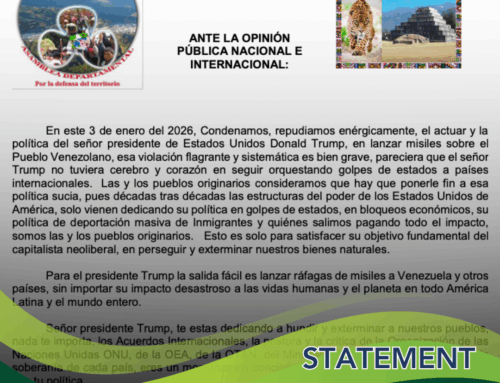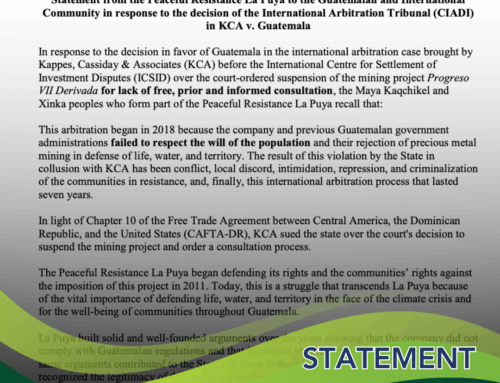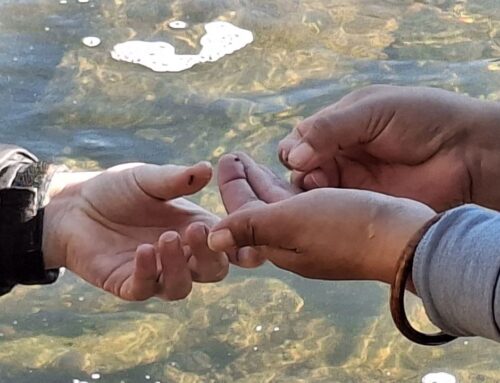“In order to suffer what we have suffered, we must be committed. We have to imagine ourselves like pencils; if we aren’t worn down, then we aren’t doing our part” – Community leader from Jalapa arrested in September for protesting against Tahoe Resources’ Escobal silver mine
Just over one year ago, on September 17, 2012, 31 people were arrested during a peaceful protest against Tahoe Resources’ Escobal project in San Rafael Las Flores, Santa Rosa. 26 community members, many active in the local Catholic parishes, were charged with terrorism and arson, accusations that were finally thrown out more than six months later when a judge ruled there was insufficient evidence to proceed to trial.
While the use of the justice system to stymie popular opposition to large-scale development projects has become increasingly common throughout Guatemala, the role of the companies in promoting the criminalization of community leaders has been less well understood. However, an incident report authored by Alberto Rotondo, former security manager for Tahoe Resources currently facing trial for an armed attack against protesters, offers a glimpse at the internal policies of the wholly-owned Guatemalan subsidiary, Minera San Rafael, and insight into their strategy to address community opposition.
The report outlines the company’s investigation of local institutions and communities it believes are responsible for mobilizing the population against the mine. The intelligence gathered by Rotondo and his team includes names, individual cell phones numbers and family relationships. The July 2012 report highlights the Catholic Church as the key institution responsible for communities’ “anti-mining” agenda and was presented to the Guatemalan Public Prosecutor as evidence in a separate investigation of explosives stolen in November 2012.
In the report Rotondo recommends, “The initiation of legal actions as these events warrant against all people named in the above paragraphs and others involved.” He goes on to urge the implementation of “a strategic legal and public media communications campaign to prove the involvement of the groups responsible for these actions, especially the involvement of the Catholic Church so that the authorities are forced to take legal action against them.”
Since Rotondo wrote the report in mid 2012, there have been more than 60 legal processes initiated against community members in connection with their opposition to Tahoe’s Escobal silver mine. The majority of the charges have been dismissed due to a lack of evidence and the remaining accusations, while still outstanding, have failed to move past the investigation stage. The impacts of criminalization on communities, families and individuals, however, have left their mark. In late September 2013, victims of criminalization and violence stemming from the presence of the mine gathered to share their experiences and seek out resources to confront ongoing persecution.
Many of those gathered shared personal stories of violence suffered at the hands of national police and private security guards during violent evictions of peaceful protests against the mine. Immediately following these evictions, they indicated that the trauma continued. Many community members were transferred to a Guatemala City prison where they suffered intimidation and fear, in addition to hunger and physical injury. In the case of those arrested in September 2012, their hearing was canceled three times before the process was officially closed, aggravating the considerable psychological trauma already suffered by the accused.
“During the eviction and in prison, I suffered beatings, insults and humiliation, but I am here with my head held high. I am not facing this with fear, but with courage. I am committed to this struggle and it doesn’t end here. It is just beginning.” – Community leader from Jalapa arrested in September, who shared her traumatizing experience in one of Guatemala City’s maximum security prisons.
During the gathering, community members expressed the joys and sorrows of their struggle in defense of territory and the right to self-determination. Leaders from Nueva Santa Rosa, Santa Rosa de Lima and Mataquescuintla shared a sense of accomplishment felt after successfully organizing community referenda in all three municipalities, in which the populations resoundingly rejected mining in their territories. As a result, even while criminal prosecution for their opposition to Tahoe’s project is an ongoing threat, community leaders remain committed to their struggle against the mine.
“I am leaving here feeling better than when I came. I know that I am not alone.” – Community leader and victim of violence from San Rafael Las Flores, Santa Rosa reflects on the outcome of the September gathering.
NISGUA has accompanied communities in opposition to the Tahoe Resources Escobal mine since 2011.






Leave A Comment